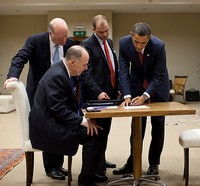It looks like the vaunted U.S. pivot to Asia is going to be delayed. The ongoing conflict in Syria and the escalation of tensions with Iran make it highly unlikely that Washington will be able to shift away from its long-held priority focus on the Middle East anytime soon.
When the Asia pivot was first floated by the Obama administration in 2009, it was based on a series of strategic assessments about the likely future of the Middle East. There was guarded optimism that a combination of effective sanctions and deft diplomacy could produce a workable deal on the Iranian nuclear program. The U.S. disengagement from Iraq was proceeding on schedule, and confidence was high that a surge in Afghanistan might similarly put that country on a positive trajectory allowing for the U.S. to successfully terminate its combat mission there. Then-Secretary of Defense Robert Gates’ unequivocal pronouncement that any future U.S. leader who proposed a massive military intervention in the region should have “his head examined” seemed to indicate that once Iraq and Afghanistan were tidied up, the United States wouldn’t be “coming ashore” anywhere else anytime soon. And the smart Washington money was on a series of next-generation leadership transitions -- among them Gamal Mubarak in Egypt and Seif-al-Islam Gadhafi in Libya -- leading to political and economic reforms.
Many of those assumptions have been upset by the events of the past year. The Arab Spring deposed a number of familiar and predictable faces, while installing previously unknown ones, such as Egyptian President Mohamed Morsi. In so doing, it has introduced a great deal of uncertainty into the politics of the region as to whether successor governments will continue to support the American security agenda, undermining part of the assumption on which the U.S. pivot to Asia was based: namely, the assessment that the U.S. could continue to count on the strong support of key states such as Egypt. And while the United States remains committed to turning over security responsibilities to the Afghan government in 2014, no one expects a rapid American disengagement from Afghanistan to follow.

